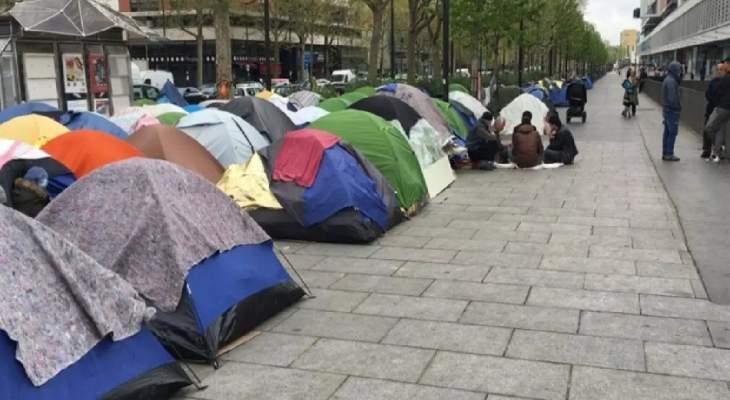
About 100 migrants, most of them Sudanese, live in a random camp under a bridge on the banks of the Seine River in Paris, amid the severe cold wave hitting the country, hoping that France will include them in its plans to shelter the displaced, after they fled the hell of the civil war raging in their country.
On the banks of the Seine River in the capital, Paris, in the evening, when temperatures drop below two degrees below zero, young men gather around a small fire that they have painstakingly ignited, exchanging conversations in an attempt to distract themselves from the bitter cold and the complex reality of their lives without shelter.
A 19-year-old Sudanese young man, Al-Deif Mohammed, says, “They told us that once we reach Europe, we will get housing and go to universities and schools. Look at our condition, we live on the street despite this freezing cold.”
Most of these immigrants arrived in France recently, and since their arrival, they spend their days in this camp, which is completely hidden under the bridge, under which pedestrians rarely pass, and the monotony of their days is only interrupted by bicycles passing by them.
All of these migrants came to the Italian coast during the past months, after crossing the sea on rickety boats, but they decided to continue their journey to France.
Al-Deif Mohammed continues, “I arrived in Italy last November, after crossing the Mediterranean on a rubber boat that set off from Libya, with 43 people on board. I decided with a group of my Sudanese companions to move to France. Frankly, I had no clear reason that prompted me to move other than the fact that the French language is used in more than one country, unlike Italian.”
In an interview with the “InfoMigrants” website, Anthony from the “Sawa” association said, “We come to the camp to distribute aid weekly, on Sundays and Mondays. We cook meals and distribute them during our tours, and we also distribute hot coffee. This evening we distributed all the quantity that we brought. Because there are a lot of migrants. We didn’t have enough for everyone. These people need clothes and tents without holes in them as much as they need food.”
Al-Deif Mohammed comments, “We do not suffer from a problem related to food and drink. The associations provide us with that, but we do not know what the next step is regarding accommodation or obtaining residency. We also suffer from a complete loss of contact with our families in Sudan.”
Regarding the accommodation of these migrants, Sophie said, “The governorate has a few hundred places, which is a small number compared to the number of people on the street. The emergency accommodation system, by dialing 115, is completely saturated.”
In the face of the cold wave that the country is currently witnessing, different French regions announced the activation of the “extreme cold” plan successively, and the “Ile-de-France” region provided 50 places to shelter families or single women, and 50 places for men for starters, according to the Le Parisien newspaper.
Housing Minister Patrice Vergriete also announced that additional funding of €120 million would be allocated to “strengthen the emergency accommodation system.” This amount is expected to cover the costs of 10,000 new accommodations.
According to the minister, this increase in the budget will be allocated to accommodate women and children living on the street without shelter, whose number is estimated at about 3,000 people according to associations, in addition to contributing to “an in-depth reform of the emergency accommodation system.”
The French Parliament adopted a tough immigration law last month, after the far right voted in favor of it, while human rights and humanitarian organizations have expressed their concern over it because they see it as undermining the right to asylum, family life procedures, and other rights of foreigners linked to the judiciary and freedoms.
It is worth noting that this immigration file is the second most important in the country after the retirement law amendments, which the government forcefully passed through the use of Article 49.3 of the Constitution.





